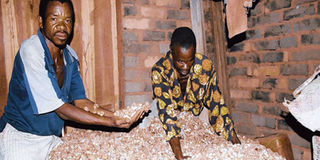Low prices worry cashew farmers

Lindi Region cashewnut farmers display their crop following a drop in their prices in the 2011 season. The Cashewnut Board of Tanzania (CBT) announced a new indicative price of Sh 100 per kilogram of the crop this season, down from Sh 1,200 in the previous one. PHOTO | FILE
What you need to know:
This, according to Mr Mmavele, was the same language used last season where some farmers failed to get their rightful pay, except for those who strongly demanded better prices and were paid their full amount, thus causing unrest in the area.
Dar es Salaam.Fear is mounting among Lindi residents with farmers expressing dissatisfaction with the recently announced indicative prices of cashewnuts, a situation that has rekindled memories of chaos in the region early this year.
At least 14 houses were destroyed in April, this year, when cashew nut farmers in Lindi Region rioted over what they considered inadequate compensation for their crop.
They complained that their earnings had been unpredictable due to the fluctuating global prices of their crop.
The Cashew nut Board of Tanzania (CBT) recently announced a new indicative price of Sh 100 per kilogram of the crop this season, down from Sh 1,200 in the last season.
But farmers have since raised concern that the new prices would see them get almost nothing because some of them did not get full payment for their sales in the last season.
Speaking during a cashewnut investors’ conference in Dar es Salaam on Monday, some farmers expressed fear that the new indicative prices had sent panic among their colleagues in Lindi and Mtwara, warning that chaos could erupt any time.
“Farmers are complaining about the new prices because they cannot understand the situation. If immediate measures are not taken, the region may experience mmore serious chaos than what was seen early this year,” said Edward Mmavele, a farmer in Masasi.
He said farmers felt that CBT was not doing enough to help improve their lives, more so following a statement that farmers would get Sh600 as downpayment and the remaining Sh400 would only be paid depending on the market.
A copy of a receipt issued by the Tandahimba-Newala Cooperative Union seen by The Citizen states: “The total payment for both first and second installments may be below the indicative price depending on the market price.”
This, according to Mr Mmavele, was the same language used last season where some farmers failed to get their rightful pay, except for those who strongly demanded better prices and were paid their full amount, thus causing unrest in the area.
Faraji Njapuka, the chairman of Tandahimba Farmers Association (TAFA), said such a method only benefited farmers in 2008/2009 where they got bonus, but again others were given Sh150 of the Sh 200 per kilogram except those who forcefully demanded it that got the whole amount.
He said it was unrealistic for the indicative price to stand that low while price of a kilogram of sulphur remains Sh1200.
Another stakeholder, Wilson Chacha from Tandahimba echoed the same feeling, saying, “All is not well among farmers and we might experience a repeat of what happened early this year”.
But in a quick rejoinder, the Cashewnut Board of Tanzania director general, Mr Mfaume Juma dispelled the fears, saying this year farmers in the southern region have started getting betters price for their produce.
He said in the last two auctions farmers in Mtwara received payment of Sh 1500 per kilogram of cashewnut, up from the indicative price of Sh1000 per kilo.
“We expect farmers to get better prices this as there are indications of a good season this year, but this is still pegged on the prices at the global markets” he said.
He said fluctuation of prices was a fact that the government cannot control as it no longer do business and it is determined by the international market.




